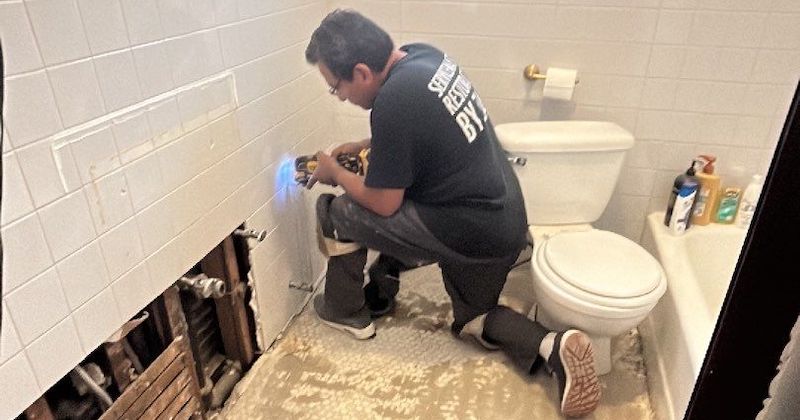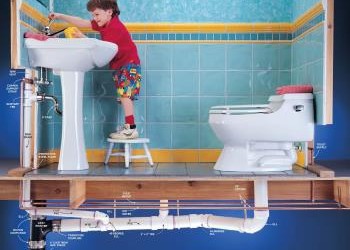Ways to Handle Your Bathroom Plumbing: Guidelines for New Homeowners
Ways to Handle Your Bathroom Plumbing: Guidelines for New Homeowners
Blog Article
What're your thoughts with regards to Essential DIY Bathroom Plumbing Tips Every Homeowner?

For brand-new home owners, understanding and keeping restroom pipes can save both time and money by stopping pricey concerns down the line. Right here are some vital washroom plumbing suggestions to help you keep every little thing running efficiently.
Get Ready For Winter
Safeguard your pipes from cold during winter by protecting pipelines in unheated locations like basements, attic rooms, and garages. During severe chilly, allow cold water drip from taps offered by subjected pipelines to aid avoid cold.
Set Up Routine Upkeep
Consider organizing yearly evaluations with a certified plumber. They can find problems that you could miss out on, such as hidden leaks or deterioration on pipelines and components. Regular upkeep helps prolong the life of your pipes system and can protect against emergency situations.
Familiarize Yourself with the Key Shut-Off Shutoff
Understanding where the major water shut-off shutoff lies in your home is critical. This permits you to promptly shut off the water supply in case of major leakages or throughout plumbing emergencies, stopping comprehensive water damages.
Routinely Check for Leaks
Small leaks can cause large issues. Routinely examine under sinks, around bathrooms, and near pipes fixtures for any type of signs of leakages. Seek moisture, little drips, or rust. Catching and repairing leaks early can protect against a lot more significant damage and conserve water.
Maintain Your Hot Water Heater
Ensure your hot water heater is readied to an ideal temperature level (typically about 120 degrees Fahrenheit) to avoid scalding and lower power usage. Flush the storage tank each year to remove debris build-up, which can lower the efficiency and life expectancy of your heater.
Upgrade Your Components
If your home has older fixtures, think about updating to more reliable models. Modern bathrooms, showerheads, and taps are made to utilize much less water while providing great stress, which can significantly decrease your water costs and environmental impact.
Beware with DIY Pipes Fixes
While it's tempting to take care of all home repair work on your own, beware with pipes. Some concerns might need expert proficiency, specifically if they include main water lines or sewage system repairs. Employing a specialist can sometimes be a lot more cost-effective than DIY, specifically if it avoids further damage.
Do Not Disregard Slow Drains Pipes
If your sink or tub is draining gradually, it's commonly an indication of a blockage developing. Addressing this early can protect against a complete clog. Make use of a bettor or a plumbing's serpent to remove particles. Avoid using chemical drainpipe cleaners as they can damage your pipes over time.
Know What Not to Flush
Toilets are not waste disposal unit. Prevent purging anything besides toilet tissue and human waste. Items like wipes, womanly hygiene items, and cotton swabs ought to be thrown away in the trash to stop obstructions and sewer backups.
Install Strainers in Drains
Area filters in your sink and bath tub drains to catch hair and various other debris prior to they enter your plumbing system. Cleaning up the filters frequently will help stop build-up and keep water moving openly.
Conclusion
Comprehending and maintaining your home's shower room pipes can prevent numerous usual problems. By following these vital ideas, you can guarantee your shower room continues to be functional and efficient, conserving you money and time over time.
Essential Plumbing Tips for Homeowners: Keep Your Pipes Flowing Smoothly
As a homeowner, understanding the basics of your plumbing system can save you time, money, and a lot of headaches. Plumbing issues can range from minor annoyances like dripping faucets to major problems like burst pipes that cause significant damage. This guide provides essential tips to help you maintain your plumbing system and tackle common issues.
Understanding Your Plumbing System
Supply System: Brings fresh water into your home from a municipal source or a well. Drain-Waste-Vent System: Removes wastewater and vents sewer gases outside. Fixtures and Appliances: Includes sinks, toilets, showers, dishwashers, and washing machines. Basic Maintenance Tips
Regular Inspections: Periodically check for leaks, corrosion, and other signs of wear and tear. Look under sinks, around toilets, and near water heaters. Know Your Main Shut-Off Valve: In case of a major leak, you’ll need to shut off the water quickly. Ensure everyone in your household knows where the main shut-off valve is located. Prevent Frozen Pipes: In cold climates, insulate exposed pipes and let faucets drip during extreme cold to prevent freezing. Use Strainers: Install strainers in sinks and tubs to catch hair, food particles, and other debris that can cause clogs. Common Plumbing Issues and Solutions
Clogged Drains:
Prevention: Avoid pouring grease down the drain and use drain screens to catch debris. DIY Fix: Use a plunger or a plumbing snake to clear minor clogs. For stubborn clogs, a mixture of baking soda and vinegar can sometimes help. Leaky Faucets:
Prevention: Replace washers and seals regularly. DIY Fix: Turn off the water supply, disassemble the faucet, and replace worn parts.

This Website Report this page